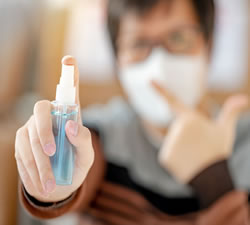 The Commonwealth Scientific and Industrial Research Organisation (CSIRO) has warned against the increasing practice of spraying face masks with sanitiser in order to make them last longer.
The Commonwealth Scientific and Industrial Research Organisation (CSIRO) has warned against the increasing practice of spraying face masks with sanitiser in order to make them last longer.
In a new Report, The Effect of Sanitizing Treatments on Respirator Filtration Performance, the CSIRO says increased exposure to alcohol-based sanitisers actually reduced a mask’s effectiveness.
In a statement, the Organisation said the study, published in the International Journal of Environmental Research and Public Health, was believed to be the first of its kind in the world to investigate the impact of vapours from alcohol-based hand sanitisers and cleaning solutions on the performance of (K)N95 and P2 face masks.
It said CSIRO researchers found that disposable respirator masks were able to retain their effectiveness after either four hours of continuous exposure to alcoholic sanitiser vapours or one direct spray of sanitiser, but any further exposure had the potential for more serious degradation.
“Additionally, exposing masks to a high concentration of alcoholic vapours left them so compromised that they no longer offered protection from airborne hazards,” the CSIRO said.
Researcher at the CSIRO and lead author of the Report, Jurg Schutz said the findings would help inform people on how best to care for their single-use face masks and could be used by manufacturers to conduct further testing.
“Single-use face masks will continue to be part of many of our lives as they provide us with a defence against COVID-19, its variants and any future pathogens, but we had been hearing stories about people trying to prolong the life of these masks by cleaning them,” Dr Schutz said.
“We started thinking about the kinds of products people have been using more during the pandemic, like alcohol-based hand sanitiser and cleaning solutions, and realised these could impact the electrostatic properties of face masks,” he said.
Dr Schutz said masks relied on having an electrostatic charge that attracted particles and trapped them like a sticky spider-web, “but we also know this charge can be destroyed by highly-concentrated alcoholic vapours”.
The 26-page open access Report can be accessed at this PS News link.









